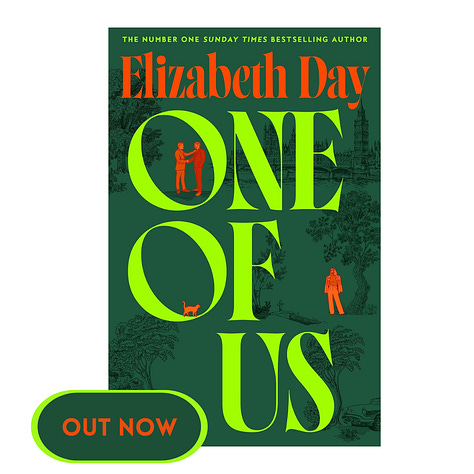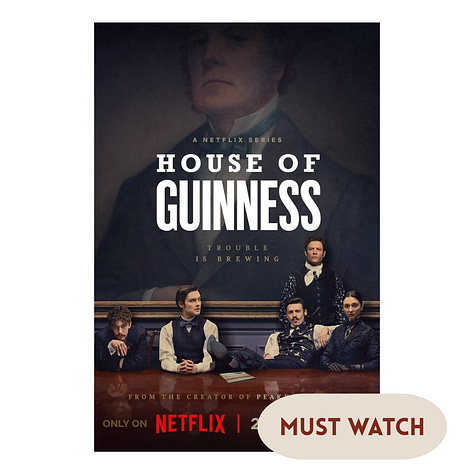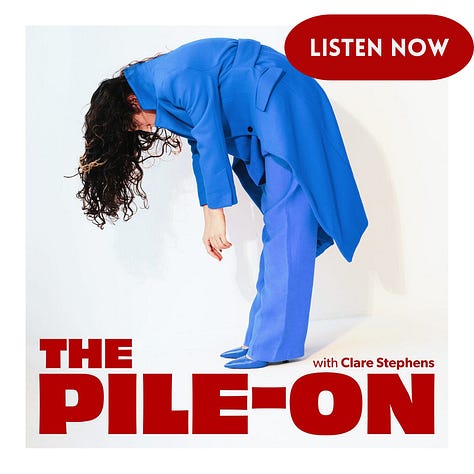Sunday Digest: 10 TED Talks That Changed My Outlook on Life
These TED Talks have completely changed how I think about creativity, failure, writing, love, and life itself.



📚 One of Us by
is a sophisticated exploration of how far people will go to belong. In this sequel to The Party, Martin is drawn back into the orbit of the powerful Fitzmaurice family after years of estrangement, determined to settle old scores with his former best friend, Ben—now a rising political star tipped for Prime Minister. But behind the family’s glittering facade lurk fractures. As secrets unravel and tensions mount, Martin and Ben are forced to confront the true cost of loyalty, privilege, and power. I loved it! I believe it could be read as a standalone work.🎥 “House of Guinness” is an ambitious historical drama created by Steven Knight. The series opens in Dublin, 1868, where the death of the Guinness family patriarch throws one of the world’s most powerful brewing dynasties into turmoil. His four children inherit not just the family fortune and the legendary brewery, but also the burden that comes with it. The series leans hard into emotional stakes, think a mix of Succession and Peaky Blinders (both of which I love).
🎧 The Pile-On, hosted by
, shows what happens when the internet turns on you. Each episode sets to explore the deeply personal stories of people caught in online pile-ons—the emotional toll, the backlash, the isolation. In the first episodes, Hannah Ferguson describes how a political comment triggered an avalanche of threats and criticism, even from her own community, revealing how quickly public judgement can turn cruel. Stephens’ novel, The Worst Thing I’ve Ever Done, with a similar premise, is out this week! I haven’t read it yet but it seem to be very promising.I have always believed that stories are one of the most powerful ways to connect with the world, and much of my inspiration comes from listening to the journeys of others. So no wonder that I’ve been obsessed with TED Talks.
Over the years, I’ve returned again and again to these ones for bursts of inspiration, perspective shifts, and kicks in the right direction. They have completely changed how I think about creativity, failure, writing, love, and life itself.
I hope one of them might shift something for you, too.
Robert Waldinger, psychiatrist, psychoanalyst, Zen teacher, and director of the Harvard Study of Adult Development, shares insights from one of the longest-running studies of adult life ever conducted. Waldinger distills three major lessons from the decades(!) of data and shares practical takeaways and reflections.
A must watch for everyone who wants to have a good life!
In “Do Schools Kill Creativity?”, Sir Ken Robinson delivers a witty, provocative, and profoundly human critique of modern education systems. His central claim is that we’re educating children out of their creative capacities by privileging academic skills over the arts, stigmatising mistakes, and imposing rigid hierarchies of intelligence.
I first watched this years ago, and it still rings true. It reminded me that creativity is not a luxury—it’s an essential part of being human and must be protected at all cost.
Elizabeth Gilbert challenges the pressure placed on creative people to be geniuses, arguing instead that we have genius, a mysterious force that visits and departs, rather than something we alone must embody.
Gilbert suggests that by reimagining creativity as a collaboration with something outside ourselves, a force that uses us rather than one we must own, we might protect our sanity, persist in our efforts, and remain open to possibility even through failure.
As someone who struggles with the weight of creative pressure, Gilbert’s way of reframing inspiration as something outside of ourselves gives me room to breathe.
Nigerian author Chimamanda Ngozi Adichie warns against the oversimplification of people, cultures, or countries by telling only one narrative about them. Drawing on her own experiences growing up reading Western books and later moving to the U.S., she shows how such limited stories foster stereotypes and deprive people of dignity. She argues that the problem with stereotypes is not necessarily that they’re false, but that they’re incomplete, because they present a single perspective until it ceases to be a perspective but the only story. Adichie calls on us to reject reductive narratives by seeking and telling many stories, thus recognizing the full humanity and complexity of each person and culture.
This talk opened my eyes to the importance of multiple perspectives. It changed how I read, how I write, and how I listen to others.
Reproductive psychiatrist Alexandra Sacks introduces the concept of matrescence—a developmental stage analogous to adolescence, but pertaining to the process of becoming a mother. She argues that many of the emotional turbulence new mothers experience—self-doubt, guilt, ambivalence—are not necessarily signs of postpartum pathology, but rather part of a natural, often unspoken shift in identity. Sacks frames this transition as a “push and pull,” a hormone-driven pull to bond with the baby, counterbalanced by the push to maintain one’s own needs, relationships, and sense of self. Her call is for more openness, dialogue, and awareness so that new mothers might feel less isolated, less stigmatised, and better supported.
I am obviously obsessed with all things matrescence at the moment and found the talk surprisingly moving.
Alain de Botton critiques modern notions of success and failure, arguing that contemporary society creates intense anxiety by tying emotional rewards to material achievements and status. He points out how in a meritocratic world, failure feels deeply personal, because we assume that if we don’t succeed, it must be our fault. He warns against job snobbery, the tendency to judge people by their profession alone, and encourages us to take ownership of our own definitions of success. Rather than surrendering to external measures, he invites us to be gentler with ourselves, to question dominant assumptions, and to pursue work and goals that truly resonate with our own values.
This talk softened the sharp edges of ambition for me. It helped me see that success is deeply personal and doesn’t have to look the same for everyone.
Raw, moving, and deeply human. Solomon reframed adversity not as something to escape but as something that can shape meaning. He shares deeply personal stories of adversity, from childhood exclusion and discrimination to societal prejudice, and argues that life’s most painful experiences can become sources of strength when we forging meaning and build identity through them.
I like listening to people’s struggles and failures and what they learn from them. One of my favorite podcasts is How to Fail with Elizabeth Day. I learned much more from people’s failures than from their success stories.
Elif Shafak argues that stories are far more than entertainment, they are bridges that connect people across cultural, political, and personal divides. Drawing on her own experience as a Turkish writer navigating multiple identities, she shows how fiction resists narrow labels and binary thinking, giving space for complexity and empathy. Shafak emphasizes that literature has the power to amplify silenced voices, challenge stereotypes, and help us see the world through others’ eyes. Ultimately, she suggests that fiction is deeply political because it shapes how we imagine ourselves and each other, encouraging openness, diversity, and human connection.
Hilarious, relatable, and surprisingly motivating. Every time I feel myself spiraling into procrastination, I think about his “Instant Gratification Monkey.”
Tim Urban explores why we procrastinate by introducing the Instant Gratification Monkey, the Rational Decision-Maker, and the Panic Monster—three forces constantly battling inside our brains. He explains how procrastinators often get stuck in the Dark Playground, doing unproductive but easy things until panic finally pushes them to act. He points out that the most dangerous kind of procrastination happens with goals that have no deadlines, where the Panic Monster never arrives, leaving dreams unrealised. Personally, I found his talk slightly unsettling—it’s comforting to see procrastination framed as a universal human struggle, yet sobering to realize how easily we can let time slip away while waiting for pressure to save us.
Brené Brown returns to the terrain she first explored in The Power of Vulnerability (also a great talk!), this time zooming in on shame as a force that keeps us small, silent, and disconnected. She describes shame as a swampland of the soul, an internal, corrosive voice that whispers “I am bad,” rather than “I did something bad.”
Brown argues that shame thrives in secrecy, silence, and judgment, and that the antidote is empathy—the willingness to share our stories and listen to others’ with compassion.




